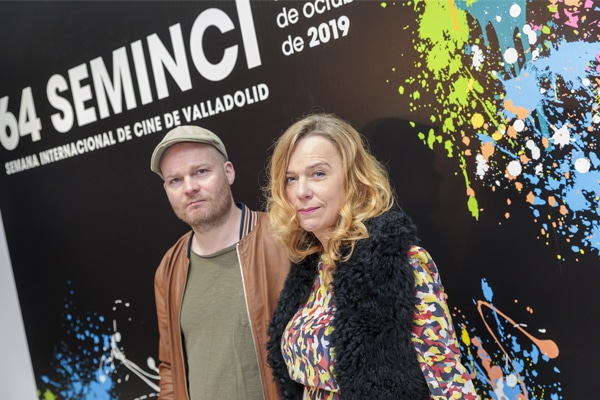
In his new film, the Icelandic director, who won the Golden Spike for Rams in 2015, revisits the rural setting he knows so well.
24/10/2019.- On Thursday, Icelandic filmmaker Grímur Hákonarson presented his latest film, The County, participating in the Official Section of the 64th Seminci. The film is set in a small Icelandic community controlled by an agricultural co-op that, as Hákonarson explained, mirrors the world and the way in which fear and power, cloaked in a nationalist ideology, are used to control people.
Hákonarson took as a reference that real community, known in his country as the “Icelandic Sicily”. The only co-op still active of the many that were created in the country since the 19th century and that disappeared as a result of bankruptcy in the 90s is there.
“It is a small community, and the co-op corners much of the business, the local government, and so on — it exerts a sort of economic and even spiritual repression on the locals,” said the filmmaker. Hákonarson puts the corruption and power depicted in the film down to the fact that the farmers have left the management of the co-op in the hands of outsiders who end up treating the business as if it were their own.
In Hákonarson’s opinion, both the place and the topics he depicts in his feature film mirror the world, since what is going on in that community can be found on a larger scale in many other European areas. “It is an autocratic community whose ruler wants to have control over everything, and resorts to fear, to that nationalist ideology, to control the local people,” said Hákonarson.
From documentary to fiction
The County began as a documentary born from extensive research on the subject, and on the role that the co-op played in the area and the “repression” it exerted on farmers. When he visited the community, Hákonarson found that no one wanted to talk to him, so he resorted to fiction so he could tell the story.
This film’s setting is similar to the one in Rams, the rural setting being part of Hákonarson’s heritage — his parents were farmers and he himself spent his summer holiday working on farms, so even though he grew up in the city he has first-hand knowledge and hands-on experience on the ground. But despite choosing a rural setting again, the director said that the film that won an award in 2015 approaches farmers from a more “romantic, historical, and ancient” perspective, while The County is more modern and focuses more both on women and on the existing relationships in the community rather than on family.
“It empowered me as an actress”
The film’s protagonist, Arndís Hrönn Egilsdóttir, recalled her experience both during filming and when developing her character. Until starring in The County, she had had no contact with the rural setting and did not like animals, which forced her to work twice as hard to bring out her inner farmer.
Striving to find what would allow her to bring Inga to life, she spent a week living on a farm with a woman who taught her how to work until Egilsdóttir thought she had acquired the tools she needed to be a farmer. “I developed the role through physical work, but I also had to tread the character’s sad path, which is what gives her the courage to stand up to the system.”
The experience was extremely hard, due both to the toughness of the physical conditions during the shooting and to the fact that she was living alone, without her family, in a house by the sea for two months in the middle of winter. In spite of all that, Arndís Hrönn Egilsdóttir beams with satisfaction when speaking about those weeks: “I loved it.”
So much so that the hours of physical work, spending time with the animals, or the uniform’s weight helped her feel empowered as an actress, according to Arndís Hrönn Egilsdóttir. “The experience changed my life,” she concluded.



























![Logo Foro Cultural de Austria Madrid[1]](https://www.seminci.com/wp-content/uploads/2024/09/Logo-Foro-Cultural-de-Austria-Madrid1-300x76.jpg)








